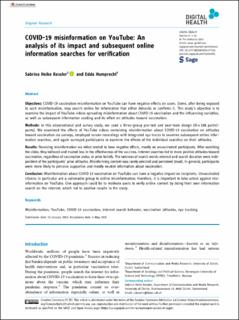| dc.contributor.author | Kessler, Sabrina Heike | |
| dc.contributor.author | Humprecht, Edda | |
| dc.date.accessioned | 2023-11-09T12:50:01Z | |
| dc.date.available | 2023-11-09T12:50:01Z | |
| dc.date.created | 2023-06-16T10:14:56Z | |
| dc.date.issued | 2023 | |
| dc.identifier.citation | Digital Health. 2023, 9 . | en_US |
| dc.identifier.uri | https://hdl.handle.net/11250/3101660 | |
| dc.description.abstract | COVID-19 vaccination misinformation on YouTube can have negative effects on users. Some, after being exposed to such misinformation, may search online for information that either debunks or confirms it. This study's objective is to examine the impact of YouTube videos spreading misinformation about COVID-19 vaccination and the influencing variables, as well as subsequent information seeking and its effect on attitudes toward vaccination.
Methods
In this observational and survey study, we used a three-group pre-test and post-tests design (N = 106 participants). We examined the effects of YouTube videos containing misinformation about COVID-19 vaccination on attitudes toward vaccination via surveys, employed screen recordings with integrated eye tracks to examine subsequent online information searches, and again surveyed participants to examine the effects of the individual searches on their attitudes.
Results
Receiving misinformation via video tended to have negative effects, mostly on unvaccinated participants. After watching the video, they believed and trusted less in the effectiveness of the vaccines. Internet searches led to more positive attitudes toward vaccination, regardless of vaccination status or prior beliefs. The valences of search words entered and search duration were independent of the participants’ prior attitudes. Misinforming content was rarely selected and perceived (read). In general, participants were more likely to perceive supportive and mostly neutral information about vaccination.
Conclusion
Misinformation about COVID-19 vaccination on YouTube can have a negative impact on recipients. Unvaccinated citizens in particular are a vulnerable group to online misinformation; therefore, it is important to take action against misinformation on YouTube. One approach could be to motivate users to verify online content by doing their own information search on the internet, which led to positive results in the study. | en_US |
| dc.language.iso | eng | en_US |
| dc.publisher | SAGE Publications | en_US |
| dc.rights | Navngivelse 4.0 Internasjonal | * |
| dc.rights.uri | http://creativecommons.org/licenses/by/4.0/deed.no | * |
| dc.title | COVID-19 misinformation on YouTube: An analysis of its impact and subsequent online information searches for verification | en_US |
| dc.title.alternative | COVID-19 misinformation on YouTube: An analysis of its impact and subsequent online information searches for verification | en_US |
| dc.type | Peer reviewed | en_US |
| dc.type | Journal article | en_US |
| dc.description.version | publishedVersion | en_US |
| dc.source.pagenumber | 0 | en_US |
| dc.source.volume | 9 | en_US |
| dc.source.journal | Digital Health | en_US |
| dc.identifier.doi | 10.1177/20552076231177131 | |
| dc.identifier.cristin | 2155188 | |
| cristin.ispublished | true | |
| cristin.fulltext | original | |
| cristin.qualitycode | 1 | |

